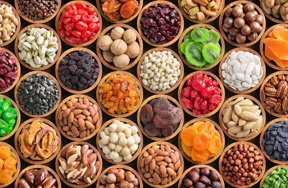How It Works: Brain Food - How The Foods We Eat Affect Our Energy
The foods you eat have a big effect on your energy level, concentration, and focus.
Dec 03, 2019Food is fuel for your body and for your brain, too. Even while you’re asleep, your brain needs fuel to keep it running. If the food you eat is efficient, your body digests it and uses it at a slow and steady rate. If you eat the wrong foods, the energy burn is inconsistent and your brain doesn’t get the nutrients it needs to keep it running smoothly. “Like an expensive car, your brain functions best when it gets only premium fuel,” says an article from Harvard University. “Eating high-quality foods that contain lots of vitamins, minerals, and antioxidants nourishes the brain and protects it.” The field of nutritional psychiatry nutritional psychiatry studies the relationship between what you eat, how you feel, and how you think.
 Brain food for thoughtCourtesy of Harvard University Medical School
Brain food for thoughtCourtesy of Harvard University Medical School
When you're hungry, like after you’ve had a full night’s sleep or if you skip a meal, you have trouble focusing. But after a big meal, a chain reaction occurs in your brain that redirects blood flow and energy to process the calories you consume. That can also make you sleepy or make it hard to concentrate. Even if you eat a small meal or snack, if you eat the wrong foods, your brain can feel just as foggy. It turns out that certain foods put a bigger drain on your system and kick it into overdrive. That’s why what you use to fuel your body throughout the day can be just as important as good study habits and exercise for your brain and your body.
Junk Food for Thought
During digestion, your body breaks down the nutrients in food. Your body is designed to digest unprocessed foods – fruits and vegetables, fish, meat, cheese, nuts, beans, foods that have fewer ingredients, and foods with ingredients you can actually recognize. Food in its natural state takes longer to break down. When your body breaks down the nutrients and sends them where they need to go, the process produces a slow, steady stream of energy.
Snack foods that include processed sugar and white flour can give you a quick fix when you’re feeling hungry. When food is processed before you eat it, it gets broken down before it goes into your body, causing a quick spike of energy, then a crash, draining your energy, your concentration, and your memory.
Read on to discover the types of food that can help you boost your brain and keep your energy level steady throughout the day!
 White rice, mashed white potatoes, juice, white bread, cakes, doughnuts, candy, ice cream, pudding, cookies, and other foods that are already broken down cause the sugar in your blood to rise, then crash quickly.Courtesy of Mother Jones
White rice, mashed white potatoes, juice, white bread, cakes, doughnuts, candy, ice cream, pudding, cookies, and other foods that are already broken down cause the sugar in your blood to rise, then crash quickly.Courtesy of Mother Jones
A good breakfast goes a long way
After a long night’s sleep, your body is running on empty. Fuel your morning with something that will burn slow and steady rather than something that will give you a quick burst and then fade. In the morning, a protein packed breakfast including eggs or nut spreads goes a lot farther than sugar cereals, white breads and rolls, jam, pancakes and pastries. For carbs, choose whole grain breads, a rice cake or unprocessed oatmeal sweetened with fruit or brown sugar.
 Did you ever notice in ads for sugar cereals point out that it’s “part of a complete breakfast”? The ad shows the cereal paired with milk, juice, fruit, and whole grain toast. In other words, leave out the cereal and you’d still have a complete breakfast.Courtesy of Courtesy of Artem Beliaikin
Did you ever notice in ads for sugar cereals point out that it’s “part of a complete breakfast”? The ad shows the cereal paired with milk, juice, fruit, and whole grain toast. In other words, leave out the cereal and you’d still have a complete breakfast.Courtesy of Courtesy of Artem Beliaikin
Movie food
Popcorn is a great source of vitamins B6 and B12, and E which are all said to help your memory, focus and overall brain power. B vitamins help unlock the natural energy in foods, so keep ‘em flowing throughout the day. Other sources of B vitamins include whole grain foods like brown rice, meat and fish, molasses, and even vegemite and marmite.
Fish really is brain food
Fish have a naturally occurring compound called Omega 3 fatty acids. This “brain food” helps you get and stay focused right away. Over time, a diet high in Omega 3‘s are linked to a decrease in the risks of dementia and stroke, may slow mental decline and boost long term memory. Salmon, anyone?
Avocados
This green fruit goes well with just about any meal: with eggs, on burgers, in sushi, in sandwiches or mixed with salsa and spread on a cracker. Buttery, creamy and easy to eat, avocados are high in Omega-3 fatty acids, which makes them a healthy, mercury-free vegetarian alternative to seafood.
Nuts to you
A handful of nuts fills your body with healthy antioxidants that help you stay focused. At the same time, proteins in nuts work to help you stay focused and retain more information for a longer time.
 How many of these brain-boosting foods have you tried? Courtesy of Thrive Global
How many of these brain-boosting foods have you tried? Courtesy of Thrive Global
Get your chocolate fix
Dark Chocolate gives similar antioxidant benefits to nuts and also contains caffeine. Each serving of dark chocolate has about 1/8 the caffeine in a cup of coffee, or 1/4 the caffeine in a cup of black tea. That’s just enough to give you some zing in your step without the jitters. It has less sugar and fat than milk chocolate. An ounce or two a day can actually be a good brain booster!
Go blue...
A handful of blueberries a few times a week (fresh in season, frozen or in juices or smoothies in cooler months) can not only boost your immunity and fortify your body against certain types of cancer, it can also help you keep your focus longer and boost your attention span. Add a handful of berries to your morning cereal or atop your yogurt. The result? No more nodding off in long client meetings!
...and green
Green leafy vegetables like kale, spinach and swiss chard contain high amounts of folic acid (another B vitamin) and vitamin K, which can help keep your mind focused and possibly prevent memory disorders such as dementia and Alzheimer's disease. Broccoli, parsley, cauliflower and brussels sprouts are also great sources. If you cook these vegetables, add a small amount of butter to help your body absorb these nutrients more efficiently.
Get a *natural* sugar boost
We’re not telling you to grab a spoonful of sugar when you’re feeling foggy. That would only lead to a quick burst of power followed by a dull fizzle. We’re talking about natural sugars found in fresh fruit, sugar-free fruit drinks and whole grain carbohydrates like pastas and pumpernickel bread. These foods have just enough natural sugars to let your body release the energy slowly and efficiently, resulting in even energy levels and a boost to your memory and mental abilities.
 Superfoods like acai and chia don't just provide energy, they also literally clean your brain!Courtesy of Jannis Brandt
Superfoods like acai and chia don't just provide energy, they also literally clean your brain!Courtesy of Jannis Brandt
Cut down on carbohydrates
A low-carb diet replaces refined sugar and flour with high protein, low-sugar foods that allow for even burn throughout the day, potentially keeping your energy level high and steady. Go for about a fist-size of protein at each meal – your fist is approximately the same size as your heart! – whether it’s cheese, nut butter, meat, or plant-based protein like tofu or edamame. You’ll see a boost in your focus by the end of the first day!
Water and exercise are brain food, too
Staying well-hydrated with at least 8 8-ounce glasses of water a day can all keep your energy levels steady, even after meals. If you do start to nod off after eating, drink a glass of water, then get up and get moving. A 20-minute walk outdoors after a big meal can pick you up without tiring you out. Exercise boosts levels of the energizing brain chemicals dopamine, norepinephrine, and serotonin.
Try something new
There are many brain boosters in the grocery store you may not have had a chance to try. Next time you visit the market, try one or two of these unfamiliar foods and see what happens: acai, quinoa, sunflower seeds,chia, millet, vegemite, brussels sprouts, whole wheat or spelt pasta, wheat germ, or barley.
Have Your Say
Do you ever zone out during school? What do you think? Does what you eat ever affect your concentration? Talk about it in the comments section below and read what others have to say.

































